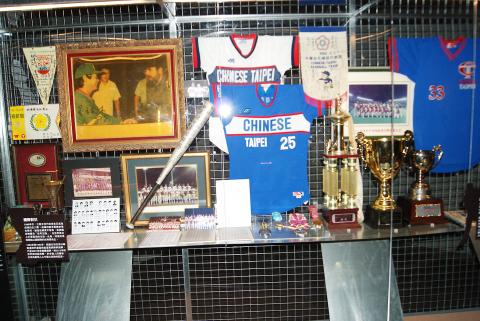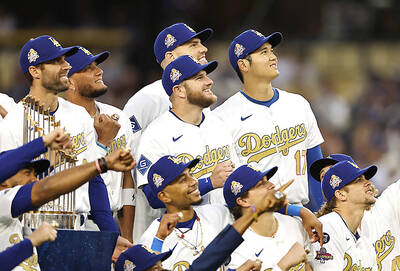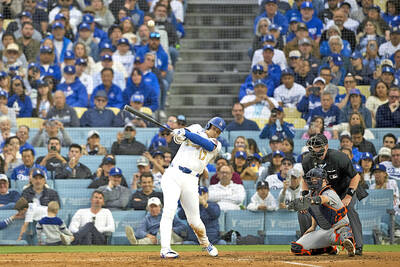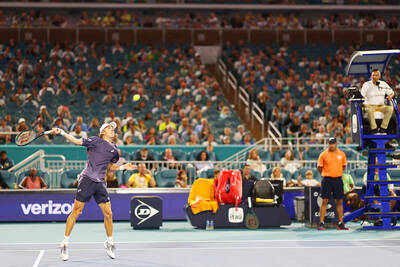The roots of baseball in this nation and its historical development to become Taiwan’s favorite game are explored through a multimedia exhibition, which opened this week at the National Museum of Taiwan History in Greater Tainan.
The exhibition is entitled “Come Back Victory — A Special Exhibit on Taiwan Baseball” and was launched on Tuesday with game representatives, officials and guests from Taiwan and the US.
“Baseball is considered the national sport of Taiwan. Many of our nation’s biggest baseball stars come from the Tainan region, so the exhibition is very special for us in many ways. It is also the first time the museum has organized an exhibition devoted to baseball,” Greater Tainan Mayor William Lai said at the launch event.

Photo: Jason Pan
Museum director Lu Li-cheng said that baseball has taken root to become one of the nation’s folk cultures, reaching into the collective memory of the masses, while building a common bond among Taiwanese and helping to forge a national identity.
On display are donated items from private collections, faded black-and-white photographs, worn-out leather gloves, old newspaper clippings and tattered baseball journals, many of which date back to the early 1900s when Taiwan was under Japanese rule.
Baseball was introduced to the nation in 1906, with the first club team formed in the then-Taiwan governor-general’s National Language School (now the Taipei Chien Kuo Senior High School).
The exhibition tells the tale of the subsequent development of the game and how its popularity spread among the receptive Taiwanese population during the Japanese-rule era.
A number of events in the nation’s century-long baseball history are highlighted, with pennants, trophies, team uniforms and baseballs covered in players’ signatures.
The breakthrough by the celebrated “Kano” baseball team from the Chiayi School of Agriculture and Forestry is chronicled with mementos and a video at the exhibition. Representing Taiwan at the finals of Japan’s high school Koshien tournament in 1931, the team won wide accolades and only lost in the final.
Their story is depicted in the upcoming movie Kano, scheduled for release in January next year. The film’s executive producer Wei Te-sheng also attended the opening ceremony.
“Baseball has a special place in many people’s hearts. In the old days, Taiwanese mostly lived in poor conditions... It was baseball that provided enjoyment and happiness for the common people during those early years,” Wei said.
Another highlight is the 1968 Hongye Elementary School team composed of mostly Bunun Aborigine children from a mountain village in Taitung County, which spurred on Taiwan’s fervor and dominance in Little League baseball over most of the next two decades.
Other features of the exhibition include the history of national teams winning at Williamsport competitions, and bundles of titles from high school and youth international tournaments in the 1970s and 1980s. There is also a record of the amateur and semi-professional leagues organized by schools and companies which started after World War II and led to the launch of Taiwan’s professional baseball league in 1990.
Three generations of Taiwanese baseball stars came to the opening — 90-year-old Hung Tai-shan, a slugger who gained fame during the late Japanese-rule era and is known as the “Babe Ruth of Taiwan,” Lin Hua-wei, an outstanding infielder nicknamed “The Deep-Mountain Tiger,” who played in the 1980s and later became manager of the Taiwan national team, and the current home-run king Chang Tai-shan, also known as the “Prince of the Forest” and clean-up hitter for the Uni-President Lions.
The exhibition runs until May 18 next year.
The museum’s Web site is: www.nmth.gov.tw.

Shohei Ohtani and Clayton Kershaw on Friday joined their Los Angeles Dodgers teammates in sticking their fists out to show off their glittering World Series rings at a ceremony. “There’s just a lot of excitement, probably more than I can ever recall with the Dodger fan base and our players,” manager Dave Roberts said before Los Angeles rallied to beat the Detroit Tigers 8-5 in 10 innings. “What a way to cap off the first two days of celebrations,” Roberts said afterward. “By far the best opening week I’ve ever experienced. I just couldn’t have scripted it any better.” A choir in the

The famously raucous Hong Kong Sevens are to start today in a big test for a shiny new stadium at the heart of a major US$3.85 billion sports park in the territory. Officials are keeping their fingers crossed that the premier event in Hong Kong’s sporting and social calendar goes off without a hitch at the 50,000-seat Kai Tak Stadium. They hope to entice major European soccer teams to visit in the next few months, with reports in December last year saying that Liverpool were in talks about a pre-season tour. Coldplay are to perform there next month, all part of Hong Kong’s

Shohei Ohtani, Teoscar Hernandez and Tommy Edman on Thursday smashed home runs to give the reigning World Series champions the Los Angeles Dodgers a 5-4 victory over Detroit on the MLB’s opening day in the US. The Dodgers, who won two season-opening games in Tokyo last week, raised their championship banner on a day when 28 clubs launched the season in the US. Dodgers manager Dave Roberts shuffled his batting lineup with all four leadoff hitters finally healthy as Ohtani was followed by Mookie Betts, then Hernandez and Freddie Freeman in the cleanup spot, switching places with Hernandez. “There’s a Teoscar tax to

BRING THE NOISE: Brazil’s Fonseca attracted a boisterous crowd that brought such dominant soccer-style energy the referee switched to Portuguese to ask for quiet Australia’s Alex de Minaur on Monday put an end to Brazilian talent Joao Fonseca’s challenge at the Miami Open, outlasting the 18-year-old 5-7, 7-5, 6-3 in an enthralling contest. Attendance on stadium court had been sparse throughout the day, but the Hard Rock Stadium turned into a mini-Maracana Stadium for Fonseca’s match, complete with Brazilian flags and soccer-style chanting. Fonseca brought his energetic brand of ultra-attacking tennis, but De Minaur was up to the challenge, coping with blistering forehands and a partisan crowd. Such was the dominance of Fonseca’s raucous support that the referee switched to Portuguese for his appeals for quiet. However, De